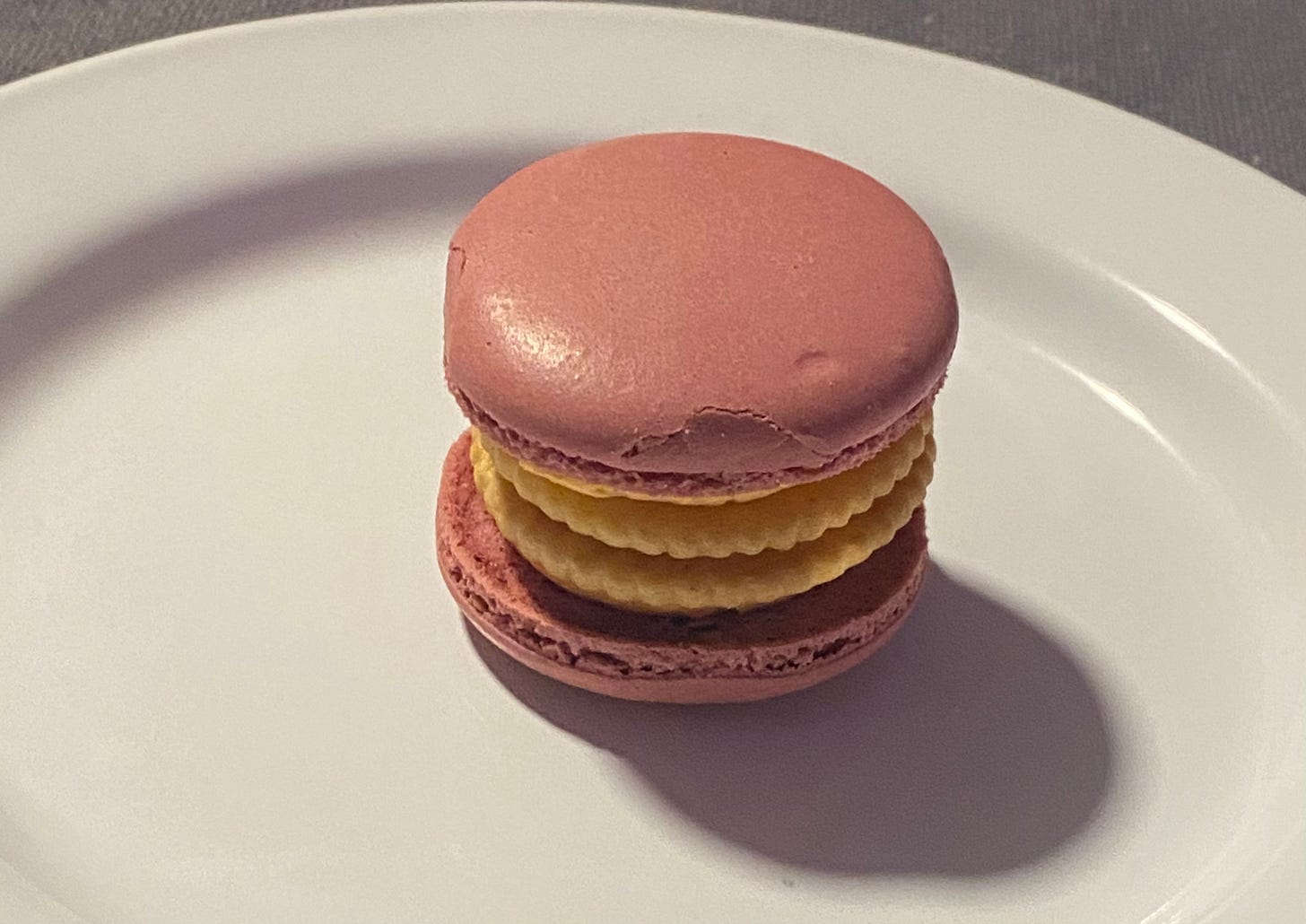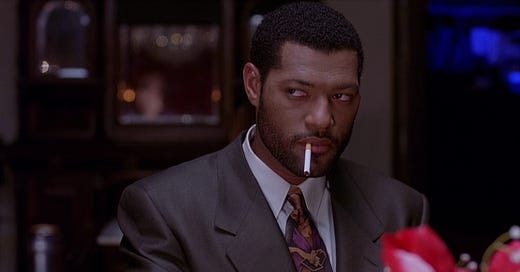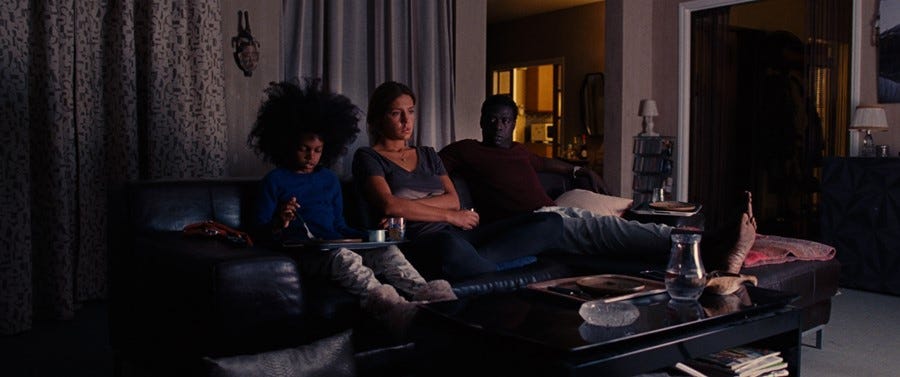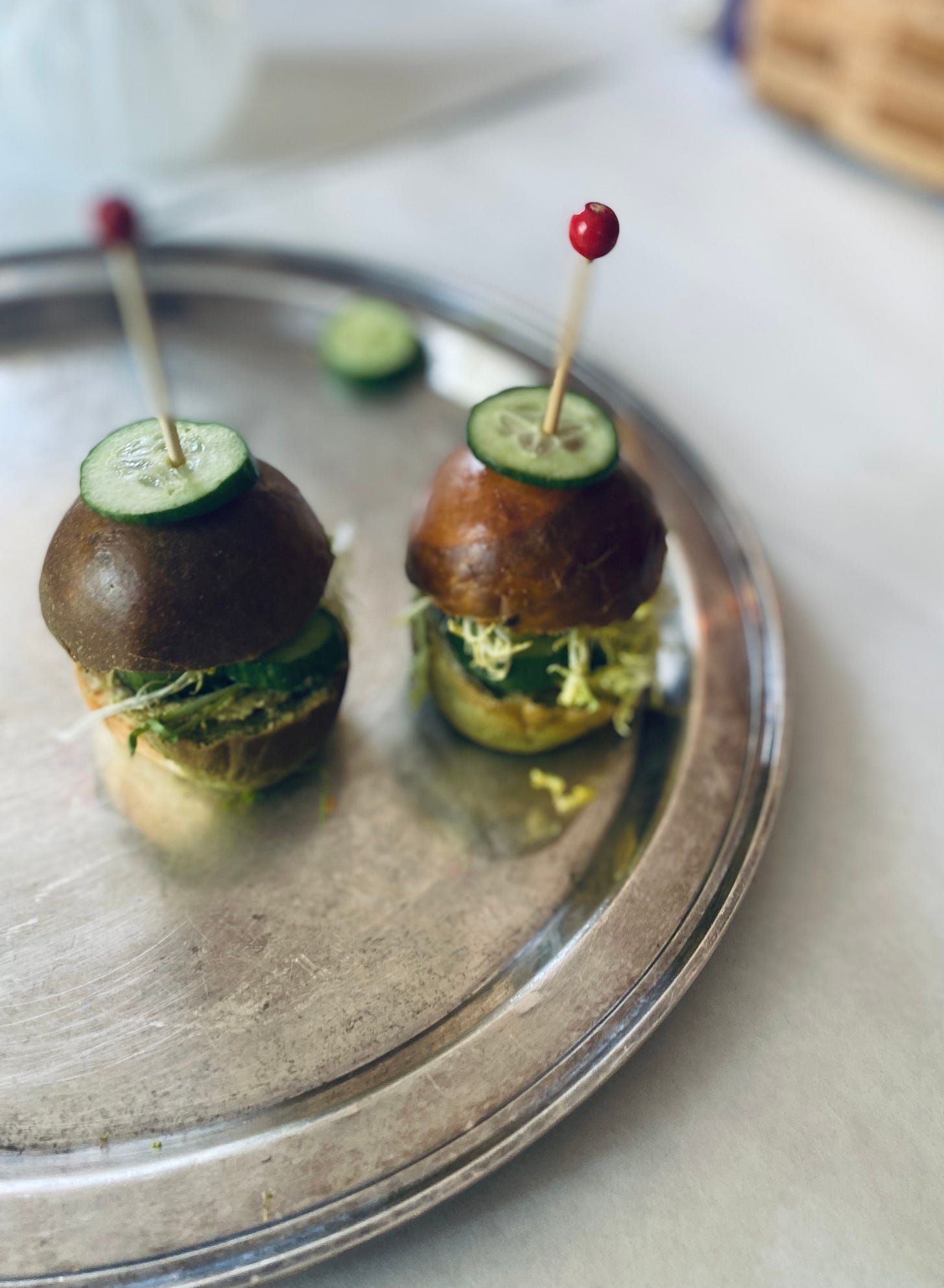Contrast and compare
On The Cable Guy, Deep Cover, The Blackening, Scarlet, The Five Devils, and the exceeding mediocrity of Casino in the LES
i. new movies: low-budget docs, a blockbuster comedy, and a pair of french films
ii. old movies: Deep Cover & The Cable Guy
iii. things i ate
iv. restaurant: Casino in Dimes Square

A reintroduction for new subscribers: moviepudding is about film, and food and occasionally musings on how these two realms interconnect, a notion that is continuously evolving, and in flux here.
This is a hodgepodge edition as I’m working on some exciting pieces outside of substack (involving, discretely, Past Lives and massive burritos), and still thinking about how best to structure these emails, particularly that last bit.
To that end, I humbly proffer this poll. Thank you in advance.
In many ways, Charles Carson, an eccentric British farmer and the subject of the documentary A LIFE ON THE FARM is a natural forebear to today’s TikTokers. He filmed countless of hours of home video around his Somerset farm, from the jellied birthing of cows to his deceased mum, whom he wheeled around the house for the sake of a bit. But without any intended audience, his collected works, first and shown at the Found Footage Festival. advocate for creative expression while offering proof of a life fully lived, free from public purview.
Nick Prueher and Joe Pickett, lifelong friends and creators of the Found Footage Festival mentioned above, were sued after appearing as a strong-man duo on plethora of local news programs, too dumb to do their homework. The straightforward documentary CHOP & STEELE follows their legal battle, supplementing the story with interviews from their comedic spiritual forbears, but what also transpires is a portrait of friendship and underdogs, choosing to preserve a way of life and denying compromise in the process.
SCARLET
Pietro Marcello, 2023
Raphaël Thiéry, a burly tree-trunk of a man, has some exquisitely rough hands, perfect cinematic fodder that has been fortuitously captured in this film of magical interventions. A trained metalworker, the French actor plays a father and widower who returns from WWI to raise his infant daughter, Juliet. They live on the outskirts of a provincial French town in a handsome farmhouse with a few other outcasts (reasons for their ostracism, unknown) including a witch.
Metabolizing fairytale elements—Juliet has the voice of an angel; a young man plummets from the sky; the witches proffer cryptic visions— along with found images, and realistic drama, Scarlet thatches together a portrait of matriarchy against a backdrop of historical change. The film shifts narratively underfoot, recasting focus onto Juliet (Juliette Jouan) as she grows into a young woman. It’s left unclear how much time has passed, and sometimes what year it is altogether. When you live contentedly, not luxuriously, the passage of time becomes unrecognizable. You’re immortal.
THE FIVE DEVILS (LES CINQ DIABLES)
Léa Mysius, 2023
This debut feature about a young biracial girl with a keen sense of smell is an emotionally bruising domestic drama and queer love story fused with a bit of science fiction. Bullied at school, Vicki doesn’t find things better at home, where the relationship between her Black father (Moustapha Mbengue) and white mother (Adele Exarchopolus) has started to evince signs of fracture. The situation is further roused with the unhappy arrival of her cagey aunt Julia, possibly struggling with a mental health condition, whose ambiguous past is gradually revealed, culminating in the film's climactic finale.
Taking literal cues from the notion that “perfume is armchair travel,” as goes the D.S. & Durga tagline, Vicky’s nose mysteriously transports her to the past, wrinkling the fabric of her family's histories, à la The Butterfly Effect. While the final scene is a frustrating addendum that mucks up the story’s dream-logic, it takes little away from the affectingly portrayed web of relationships.
The Five Devils is streaming on MUBI. Here’s 30 days free.
THE BLACKENING
Tim Story, 2023
This horror comedy, in which seven college friends must certify their Blackness by responding to trivia questions (name five Black characters on Friends)—lest they die— is a heaping dose of diabolical fun. They’ve gathered at a Juneteenth celebration in the woods that quickly goes awry. A killer is on the loose, and Barbershop director Tim Story efficiently builds tension and suspense, and I was properly scared despite knowing what’s around the corner. The most nefarious of all is the Jumanji-esque boardgame with a blatantly racist Sambo centerpiece that emerges from the basement and chides everyone to play along and compete for their survival.
A loquacious romp subverts the now well-known trope that “the Black guy dies first,” the movie also scrutinizes Black stereotypes through an impressive succession of jokes. The film is only 96 minutes long, and yet it feels much longer given the territory it covers; the jokes come every other second, fueled by digressive asides, cheeky sermonizing, and perfectly-timed one-ups-manship.
Besides trying to stay alive, the subplot involves Lisa (Antoinette Robertson, Dear White People) hiding her romantic reunion with serial cheater and ex Nnamdi (Sinqua Walls, Power) from her gay-best friend Dewayne (Dewayne Perkins) who’s tired of picking up the pieces after he breaks her heart. Perkins, a comedian, wrote the original sketch on which the film is based, and he shines only slightly brighter than the rest, making this a true ensemble film of up and comers—if you don’t know them already, you will soon: Melvin Gregg (Nine Perfect Strangers; High Flying Bird) plays a reformed gang member; Grace Byers (Empire) the biracial woman; the Daily Show writer X Mayo, the party girl Shanika. Yvonne Orji and Jay Pharaoh add star power as a happily-ever-after couple, while Jermaine Fowler—showcasing some formidable physical comedy chops—snivels and mopes around as Clifton, an Urkel-esque brother who voted for Trump. (Fowler has been cast in the new Farrelly Brothers movie, and it looks like he’ll be right at home). If these characters sound like stereotypes, that’s because they are; the magic of the movie is how it fleshes them out and makes one uniquely larger than life, and gives them each their say.
DEEP COVER
Bill Duke, 1992
Imbuing the noir framework of this film with urban grit and a triumphant conclusion, Bill Duke shrewdly rewrites the genre’s fatalism. To set the mood, the film kicks off with two gripping scenes: the origin story of Laurence Fishburne’s undercover cop, who witnesses his substance-abusing father splattered against the windshield on Christmas; and a white DEA agent (Charles Martin Smith) asking a string of Black police officers a racist joke disguised as an interview question. He’s looking for someone to go undercover and dismantle a Los Angeles cocaine ring, and Fishburne wins the job, which requires him to reenter the impoverished environment of his childhood. Let the identity-grappling begin.
Lending the film a solemn fury, Fishburne voiceovers in a near deadpan like he’s in something by Alain Renais or a twenty-year old MFA student poetry student, so it’s fitting that the end credits roll to the tune of one Snoop Dogg, another man of notably laconic affect, in his debut. Fishburne’s agent aside, the characters that populate the film seemingly act the fool—his boss is comically bureaucratic caricature; one low-level dealer is a dandy with a sociopathic hard-on for violence; a consigliere is Mickey-Boardman-esque queen.
The hodgepodge of acting styles, an array of garish performances, transforms the film into a bas relief, duly separating Fishburne, and his paramour (Betty McCutcheon), from everyone else on the moral-lowground. None is more of a testament to this than Jeff Goldblum, who, playing a corrupt attorney, begins the film in serious-thespian mode, and finishes it an unhinged loony as the character climbs the underworld-ladder and wrests control from his enemies, taking on their malevolent buffoonery as he goes.
THE CABLE GUY
Ben Stiller, 1996
Growing up, ours was a Jim Carrey-less household. My mother was morally opposed to the gangling actor’s fabulous grotesquerie, that elasticized mouth stretched into oblivion and snapped back into place at random. The movie takes on increasingly sinister tones, as Carrey’s cable-guy insinuates himself into the life of a hapless customer portrayed by Matthew Broderick, with Carrey's demeanor shifting from incredibly snide to pitifully desperate, persisting and resurfacing without warning, like an indomitable cockroach. I am dumbstruck by Carrey’s fabulous derangement (it is only now, upon viewing this film for the first time, that I realized he is a predecessor to the likes of Tim Robinson) but, moreover, shocked that everyone treats him as any other human, with every actor playing it straight while he flexes his face muscles or assaults Owen Wilson in a bathroom restaurant.. Jack Black, who plays one of the few skeptics, is ironically reserved. Too bad Stiller fails to take the movie to its logical conclusion with Carrey perverting Broderick’s character or going off the deep-end completely.
THINGS I ATE
From the More Than Cake cookbook, I made matcha milk bun sliders. The tea adds a grassy tang to the comforting sugary qualities of the bread, and butter stained green with sorrel is another marriage of the inherent sweetness of dairy and bitter green that mimics the same formula. Chives add bite and cucumbers enliven it all with crunch.
The ideal way to eat potato chips, for me, a spud-despiser, is as garnish or secondary ingredient in a composed dish.
At Ernesto’s, potato chips are draped with jamon iberico, the crispiness contrasting the fat, the oiliness complementing it.
At Stretch Pizza, a salad: Tender, bitter leaves of mizuna and frisee politely compete with dehydrated lime wheels and potato crisps, which have been vinegarized, bestowing a sense of acidity in place of dressing. (More on the pizza later, but I highly recommend it.)
CASINO
171 East Broadway
Just as the films above exhibit an aggressive cartoonishness to emphasize a point, the Dimes-Square restaurant Casino chooses to ignore the food, diverting attention instead to the atmosphere, something I’ll call stodgy kitsch.
Eating is not priority here. But as a scenery spot, it was a peculiar one, less a place to be seen by others and more of backdrop against in which to be glimpsed on instagram. The red velvet booths that line perimeter (transforming from the after-school day-glo party atmosphere of Mission Chinese, which formerly took up this space) are wholly appropriate for this endeavor. Too bad they were taken by a quintet of mainstream blondes the night I was there. Elsewhere in the dining room I spotted a group of chic and elderly strategizing a business venture, while a neighboring couple seemed both overwhelmed and underwhelmed (finally, a use just for “whelmed?”) with their food.
In throwback fashion, the menu half-heartedly channels the 80s with an Italianne melange of placating dishes. Among them: Parker rolls with Calabrian chili and honey butter; bucatini with clams dotted with Meyer lemon and bottarga, completely serviceable, but not worth $30. The tournedos rossini— a French staple of haute cuisine—aspires towards decadence but only brings turmoil.
One way to think of this dish is as a crostini on steroids: buttered crouton topped with a slice of foie gras and petite medallions of filet mignon. That the liver is wedged in between at Casino, is a fatal mistake, as it compromises the bread’s necessary staleness and accelerates its disintegration. In lieu of the customary truffles, there are black trumpet mushrooms, which were rubberized from excess water. An overly sweet of moat of marsala sauce pooled around it all. If Casino’s is an on-point rendition of this dish, representative of the sybaritic eighties, it is also one that is nearly inedible. The cocktails may be standouts, but I didn’t get to try them on that sober outing, and likely never will.











